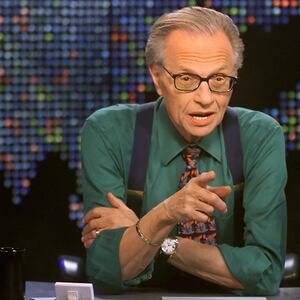On May 1, 1957, an unknown, untried radio announcer named Larry Zeiger switched on the microphone at Miami’s WAHR and became Larry King.
“I had my record ready to go, and all my life I had dreamed of this,” he recalled years later. “I turned down the mic, and I turned down the record, and nothing came out.” His first chance at being a disc jockey and right out of the gate he’d committed the cardinal sin of radio: dead air. “The general manager kicked open the door to the control room and said, ‘This is a communications business, dammit. Communicate!’ And I put on the mic, and I said, “My name is Larry King.” And then, through some combination of gut instinct, luck, or divine intervention, he began to do what he was born knowing: He started talking, directly, honestly, just being himself. “So for two minutes, you’ve been listening to a record go up and down and nothing coming out, so please, bear with me.”
It wasn’t Shakespeare, but it was pure Larry King, and after that everything was all right. He was honest with the audience, he was always himself.
He was 24 years old, and while it certainly must not have felt like it at the time, he’d just embarked on one of the longest (60+ years) and most successful careers in the history of broadcasting.
Originally hired to assist around the radio station WAHR, King—who died Saturday at the age of 87, reportedly after being diagnosed with COVID-19—got his crack at his first broadcast only because a disc jockey suddenly quit. Right place at the right time.
And he did it all: “Playing records, doing news in the afternoon, sports broadcasts—fifty dollars a week I was making,” he told an interviewer in 2017. “And there was a restaurant in Miami Beach called Pumpernick’s, a very popular restaurant.” Ten to 11 a.m. was the slow time at Pumpernick’s. Brunch wasn’t happening like it is today, so the owner offered Larry a job broadcasting from the restaurant to drive business. Early advertising, if you will. The owner paid the radio station, and Larry added a few crumbs to his 50 bucks a week. He interviewed restaurant staff, restaurant customers, anyone who just walked in the door.

Then-Republican presidential nominee George W. Bush and his wife, Laura, appear with Larry King on his CNN show in Los Angeles in September 2000.
TANNEN MAURY/AFP/Getty Images“One day, out of nowhere, Bobby Darin—the great Bobby Darin—walked in… And I interviewed him for an hour.” Darin was King’s first celebrity interview. After the show, Darin asked, “You’ve interviewed before?” King said, “No, I just talk to regular people.” Darin came back with, “I think you ought to take this up seriously because you really have a knack.”
The Bobby Darin interview opened the door to what King considered his destiny: “Since I was 5 years old I wanted to be on the radio. I just wanted to be an announcer. I wanted to be anything. I wanted to talk into a microphone.”
Even as a boy, he had big dreams, but no clear path to achieve them. Born in 1933 in New York City, he grew up up poor in Brooklyn. He wasn’t a good student. He didn’t go to college. His father died of heart disease at 44 when Larry was 9 years old, and he and his brother were raised by their widowed mother.
“People kept telling me, ‘You gotta be on the radio.’ So I would imitate radio shows.” The way other kids pick the guitar or the piano, his voice was the instrument King picked as a child. Speaking into a microphone came naturally. “Had I not done it, I would have been a standup comic. I love making people laugh. I do a lot of speaking.”
After high school, he worked a smattering of jobs—United Parcel delivery man, milk delivery sales, collection agent—no real means to realize his dream. He couldn’t even make romance work: In 1951, he married his high-school sweetheart. Their parents reportedly got the marriage annulled.
Fate intervened when he encountered a CBS television announcer who told him of the emerging media market in Florida: “It’s got lots of stations, no union, a lot of old people on the way out, a lot of young people on the way up. It’s competitive.” Still in his early twenties, King moved to Miami, where he eventually got hired at WAHR.

Actor Hugh Grant talks to Larry King on “Larry King Live” in July 1995.
AFP via Getty ImagesA year and a half later, fate stepped in again with the spontaneous Bobby Darin interview that foreshadowed Larry King Live. “I didn’t know Bobby Darin was coming in. I liked that. We used to do on my radio show—I had the first national radio talk show. We used to do a night which was ‘Who Is The Guest?’ They would not tell me who the guest is.”
After two years at WAHR, King moved to WKAT Miami where he was given his first talk show. Back then, Miami Beach was the nation’s premier resort town, crawling with all kinds of celebrities. King got the chance to hone his technique by interviewing everyone from a local plumber to Jimmy Hoffa, from Lenny Bruce to Richard Nixon.
In 1961, King married Playboy Bunny Alene Akins. Prior to Alene, there had been another marriage that lasted a year, so counting the annulled marriage, Alene was wife No. 3. After two years, they split. Alene married a different talk-show host at the station, and King married a woman who also worked at the station. When those marriages blew up, Alene and Larry were freed up to marry and divorce again, and they did! King would ultimately be married eight times, to seven women.
A messy private life did little to slow down his success as a DJ and an interviewer. In the early ’60s, while still in Miami, he segued to television, doing on-camera interviews on the talk shows Surfside 6 and Miami Undercover. (Larry King enthusiasts will love this: In 1961, he had a guest spot as a Miami DJ on a television show called Miami Undercover—not to be confused with his television interview show of the same name—in an episode called “The Thrush.” His character is “Sleepy Sam,” a DJ with a midnight radio show whose gimmick is yawning. The trademark glasses and hairstyle are the same, only he’s in his twenties and has a more affected radio voice. Two gangsters are quiet until he turns off his microphone to spin a record. Then they offer Sleepy Sam a bribe to play a record. But Sam declines. “I told you guys once. I told you twice. And for the third time, I don’t take payola from no creep little record outfit.” Sleepy Sam is shot before the opening credit sequence. I recommend the minute it takes to watch it.)
King credited much of his success to Jackie Gleason: “Jackie Gleason was very good to me. He was like my mentor—Jackie.” In 1963 or ’64, Gleason hosted a dinner party where King was a guest. Gleason went around the table and asked each guest what was impossible in his career. As King recalled the moment in 2014, “In addition to my radio work, I do a local television show every night from 9 to midnight... a studio show—guests and phone calls. Frank Sinatra’s opening at the Fontainebleau. I say Frank Sinatra, who is the No. 1 star in the world at this time… Frank Sinatra is Michael Jackson and Elvis Presley rolled into one. You couldn’t get bigger. He avoided the press. Frank Sinatra to do my radio show for three hours—during the time he’s in Miami. And Jackie, I can still see him: ‘You got him.’”
Frank Sinatra was off Monday nights. Jackie promised to deliver Sinatra. The station began running ads. The press was publicizing Sinatra’s radio appearance with Larry King. But Sinatra wasn’t responding to calls left for him at Fontainebleau. The Friday before the show, King called Gleason to confirm, and Gleason, bothered and angry, promised Sinatra will show. Monday night came. Five minutes to show time, and everybody who worked at the station, regardless of their shift, was waiting to get a glimpse of him. Still no Sinatra. Nine o’clock came and went. Finally, at five minutes after 9, just as the top-of-the-hour news portion was wrapping up, a limo with Sinatra and his PR handler pulled up, and the two got out. “I don’t know how you got him,” the handler told King. “I get paid not to get him here.”
In the studio with Sinatra, King found himself thinking about that very first radio show he did in 1957, where everything went horribly wrong but where he learned the important lesson of being honest with his audience. So he began his show by saying, “My guest tonight is Frank Sinatra. Why are you here?”
Larry King and his listeners and the press have no idea how he got Frank Sinatra. Frank tells him that he was working a show in New York, got laryngitis, and asked Gleason to sub for him. It was Sinatra’s “Jackie, I owe you one” and Gleason calling in the favor that landed Sinatra across from Larry King.

President Bill Clinton and Vice President Al Gore talk to Larry King in June 1995.
AFP via Getty ImagesBy the end of the ’60s, fame was going to King’s head, but his pockets were empty. He was a gambling and spending man, living outside his means. It all caught up with him in 1971, when he was arrested for grand larceny—the theft of $5,000 from his friend Louis Wolfson. By the time the case got to court, the charges were dismissed, because the statute of limitations for the offense had run out. But King’s career stalled. Bad press and scandal had left him jobless and bankrupt. From the ground up, he rebuilt his career, beginning with any media jobs he could get: public relations, print—didn’t matter.
Eventually, he was rehired at WIOD in Miami. In 1977, a year after he and Alene divorced the second time, he was married for the sixth time, and received a call from Washington, D.C. to do an all-night radio show, The Larry King Show, which which was live five-and-a-half hours a night until 1987 (after his first heart attack that year, he cut back to four hours a night; subsequent heart surgery forced him down to three hours a night). His radio show, however ballooned from 28 stations to 390, and he landed a local half-hour television interview show, where he interviewed Ted Turner. The Larry King Show ran from 1978-1994. On June 1, 1985, his first CNN Larry King Live interview aired. New York Gov. Mario Cuomo was his guest.

Larry King and his wife Shawn King in 2003.
Stefan Zaklin/GettyBy then, he had divorced again, but his seventh wife was right around the corner. In 1989, he remarried, and it lasted a few years. In 1997, he married his wife Shawn and stayed with her the longest. Twenty-two years—before filing for a split in a Los Angeles court in August 2019. The Larry King Show on radio and Larry King Live on cable television ran concurrently with CNN’s Larry King Live, starting in 1985 and ending in 2010. According to CNN, King conducted more than 30,000 interviews in his career.
But there was no such thing as retirement for Larry King. In 2012, he co-founded Ora-TV, and began hosting Larry King Now on Hulu and, for a time, Politics With Larry King on RT America, the Kremlin-controlled cable TV channel. He continued working in media until his death.


